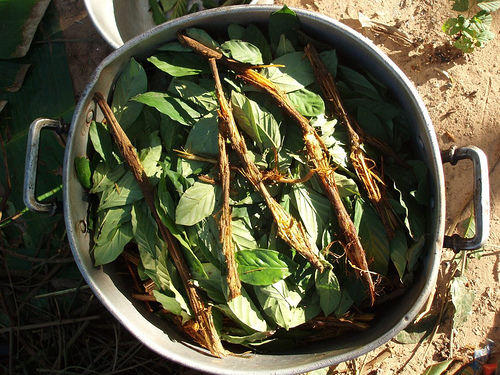A large study of the popular psychedelic brew known as Ayahuasca tea has found that five out of ten users say that mental health issues caused by the drug stuck with them “for weeks or months” even though most say they consider this to part of the experience.
The Daily Mail is reporting on the study which surveyed more than 10,000 people from 50 countries about their experience with the ancient South American brew that has become popular with stars such as Miley Cyrus, Joe Rogan, and Green Bay Packers Quarterback Aaron Rogers.
Considered to be a narcotic, ayahuasca tea is illegal in the United States except for its use by certain religious groups. Brewed from the Banisteriopsis caapi vine and other ingredients which are indigenous to countries in the Amazon basin such as Brazil, Peru, Colombia, Bolivia, and Ecuador, shamans use it to access the spiritual realm and information allegedly found in the “unseen realms”, as well as for divination and healing purposes. Considered a psychedelic drug, in addition to causing hallucinations when consumed, the drug also affects all of the senses, alters a person’s thinking, sense of time and emotions.
According to this new research, Ayahuasca “trips” to unseen realms are not exactly a joy ride. Scientists found that more than half of those surveyed reported experiencing negative mental health effects such as seeing or hearing things. One in five suffered from disturbing thoughts, nightmares, hallucinations, or felt disconnected. Seventy percent reported at least one negative side effect after drinking the tea with the most common being vomiting, nausea, headache, and abdominal pain – all of which they believed was part of the “purge”process.
A very small percentage experienced serious physical effects such as seizures (2%), respiratory arrest (1%) and cardiac arrest (1%).
“Many are turning to ayahuasca due to disenchantment with conventional Western mental health treatments, however the disruptive power of this traditional medicine should not be underestimated, commonly resulting in mental health or emotional challenges during assimilation,” the study’s authors writes. “While these are usually transitory and seen as part of a beneficial growth process, risks are greater for vulnerable individuals or when used in unsupportive contexts.”
Some of these “unsupportive contexts” have proven to be deadly. As this blog explains, an 18 year-old American named Kevin Nolan was found dead on the side of a road near Puerto Maldonado in Peru in September of 2012. He had visited the Shimbre Shamanic Center and took part in a shamanic cleansing ritual using ayahuasca. The shaman in charge of the center later admitted to police that Nolan had died after drinking an excessive dose of the brew.
Henry Miller, 19, from the UK, suffered the same fate in April, 2014, when he took part in a local tribal ritual in a Colombian rainforest and had an allergic reaction to ayahuasca. His body was also found dumped by the side of the road.
“Deaths like Nolan’s are uncommon, but reports of molestation, rape, and negligence at the hands of predatory and inept shamans are not,” writes Kelly Hearns for the Mens Journal. “In the past few years alone, a young German woman was allegedly raped and beaten by two men who had administered ayahuasca to her, two French citizens died while staying at ayahuasca lodges, and stories persist about unwanted sexual advances and people losing their marbles after being given overly potent doses.”
Wherever tourism booms, charlatans come crawling out of the woodwork, which is certainly the case in the ayahuasca business. Shamans of suspicious reputation, anxious to lure more tourists to their town, are known to mix a little toe (aka “witchcraft plant”) in the brew because of its powerful hallucinogenic qualities.
“Skilled shamans use it in tiny amounts, but around Iquitos [Peru], people say irresponsible shamans dose foreigners with it to give them the Disneyland light shows they’ve come to expect,” Hearns reports.
Even more alarming is that excessive use of toe can cause permanent mental impairment and even death from miscalculated dosages.
Taking the advice of celebrity promoters is not wise, especially when some of them seem to be suffering from negative effects in spite of praising the drug.
For example, Packers quarterback Aaron Rodgers, a four-time MVP winner, attributed his success on the field to transformative trips with ayahuasca. However, after losing five games in a row this season, he’s now being criticized for the habit.
“In order for the Green Bay Packers to dig themselves out of this hole, they need the best version of Aaron Rodgers,” said commentator Robert Griffin. “And right now, that ayahuasca seems like it has him in a completely different world.”
Miley Cyrus claims to love the drug and claims it left her “seeing snakes immediately” in an interview with Rolling Stone in 2020.
Joe Rogan, also a big promoter of DMT which is the active ingredient in ayahuasca, said in a recent podcast: “…If more people had psychedelic trips and more people had more experiences that dissolved their ego and more people had an understanding that community isn’t just a bunch of people that live together, it’s a bunch of people that care about each other — and that we could treat the world like a community.”
Judging from what this new research is revealing, ayahuasca causes more problems than it solves. Even though users insist that it’s all part of the healing process, sooner or later they will come to realize that this “trip” only heads in one direction – south.
© All Rights Reserved, Living His Life Abundantly®/Women of Grace® http://www.womenofgrace.com










